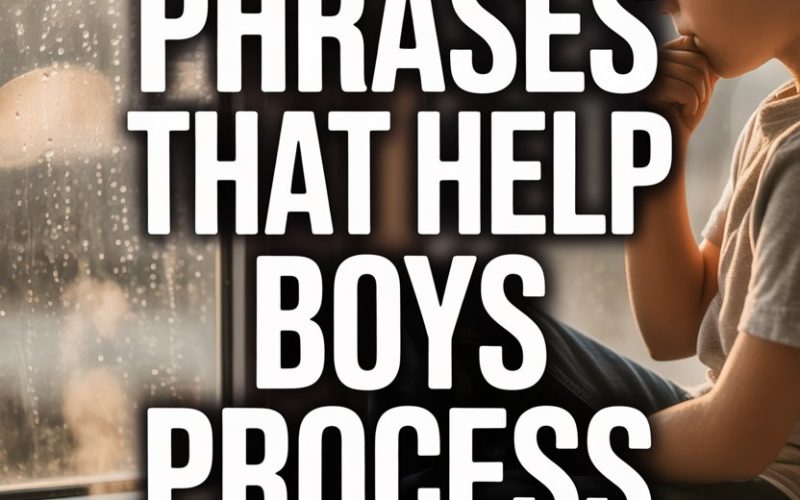Ever tried getting an emotional update from a 7-year-old boy? You might have better luck extracting state secrets from a squirrel.
Yet, underneath the grunts, shoulder shrugs, and the ever-reliable “I dunno,” there’s a world of feelings just waiting to be named—if only we knew the secret password.
Spoiler: there’s no single magic word.
But armed with the right phrases, parents can gently pry open the vault and help boys learn that feelings aren’t meant to be buried under piles of LEGO or masked with a strategic “I’m fine.”
Let’s get into three powerhouse phrases that actually work—and why they matter.
1. It’s Okay to Feel That Way
Boys, especially as they approach school age, seem to get the message (sometimes loud and clear, sometimes subtly through playground politics) that “tough” means “unbothered.”
Sad about losing a football match? “Get over it.” Upset that Timmy didn’t pick him for tag? “Big boys don’t cry,” right? Wrong.
Telling your son “It’s okay to feel that way” throws him a lifeline. Instead of rushing to fix, distract, or downplay, you’re giving permission. (Yes, like a feelings hall pass.)
Why does this matter? According to child psychologists from the Child Mind Institute, boys who hear this phrase learn that emotions are normal—not a sign of weakness.
Suddenly, anger, sadness, and even a bout of jealousy become feelings to experience, not battles to suppress or win.
Try this at home: When your child is fuming because his little brother “ruined everything” by touching his LEGO masterpiece, park yourself at eye level.
“You’re really frustrated. It’s okay to feel that way.” Wait. Pause. Don’t add a lecture about sharing or resilience just yet. Allow his feelings to exist.
You might notice the tension dial down a notch. And if he storms off anyway? That’s still progress.
Sometimes, the simple act of naming and accepting is what unlocks the conversation later (like at bedtime, when all mysterious questions and confessions surface).
2. Tell Me More About That
Boys are notorious for monosyllabic answers. “Fine.” “Yeah.” “Nope.” Occasionally you’ll get a “Sorta.” The art of drawing out more than one-word responses might feel like a Jedi mind trick, but this phrase is your trusty lightsaber.
“Tell me more about that” signals genuine interest, minus the interrogation spotlight.
It’s an open invitation—without implying he’s doing something wrong or that you’re about to launch into a grown-up monologue on the importance of “expressing yourself.”
Research from the American Psychological Association shows that boys who feel listened to—without judgment—are more likely to develop emotional intelligence and stronger communication skills.
Who knew that three extra words could set the stage for less grunting, more talking?
Try something like this: Your son comes home looking like he’s lost a wrestling match with a bag of feelings. “Rough day?” you ask. He shrugs. “Was it something at school?” Shrug. “Tell me more about that.”
You might get a grunt, or a barely-there whisper of, “Just stuff.” Stand firm. “I get it. Sometimes stuff’s hard. I’m here if you want to talk more.”
You’re not drilling for details; you’re opening the door. That invitation might not get accepted tonight, but sooner or later, your son’s likely to knock.
Bonus tactic: Use this phrase when emotions are positive, too (“You look happy about your art project—tell me more about that!”). Kids learn to associate the phrase with curiosity, not just damage control.
3. Want to Figure Out What You’re Feeling Together?
Identifying feelings is like learning a new language—one that definitely wasn’t in the Year 2 curriculum. For many boys, the options are: happy, angry, or bored. (And yes, “hungry” counts as a feeling in our house.)
That’s why “Want to figure out what you’re feeling together?” is a gamechanger. Instead of quizzing or assuming (“You seem mad!”), you’re offering to be a detective by his side. Teamwork for the win.
The strategy finds support in the work of educators at the Yale Center for Emotional Intelligence, who promote co-creating a “feelings vocabulary” with children.
When parents model exploration instead of dictation, boys feel safer experimenting with words—and less likely to shut down.
Try using visual aids. Keep a feelings chart or wheel handy.
When your son is sulking at the dinner table, say, “I can see you’re upset. Want to look at the feelings wheel and figure out what’s going on together?”
Or, get creative: “If your feelings were a weather report, what would today’s forecast be?” (Cloudy with a chance of slamming doors, perhaps?)
This phrase builds your child’s emotional vocabulary, but it also reassures him that adults don’t always have the answer key. You’re learning alongside him. The message? “I’m on your side. We can unravel this together.”
Sometimes, knowing they’re not alone is half the battle.
Putting Phrases to Work in Real Life
Maybe you’re thinking, “Sounds nice, but my child communicates in Minecraft noises and football tackles.” The trick isn’t perfection—just planting seeds.
These phrases, repeated when the emotional waters get choppy, begin to take root.
Expect awkward silences.
Expect eye rolls.
Expect it to feel slightly weird at first—like that time you tried Zumba after two decades of sitting on the side.
Most importantly, expect that these tiny verbal nudges will, over time, make it easier for your son to approach you.
Not just when he’s angry over a lost toy, but as he stumbles through the big stuff: friendships, heartbreaks, the mysterious injustice of bedtime.
You might find your own emotional vocabulary grows, too. (Yes, adults occasionally need a reminder that “fine” isn’t a feeling.)
Why Boys Often Struggle to Talk About Feelings
It’s not just you. Generations of “toughen up” messaging have left boys with fewer tools for self-expression.
According to research from Harvard’s Making Caring Common Project, boys are less likely to be encouraged to talk about emotions, and more likely to be praised for stoic or aggressive responses.
Society’s default mode is still “man up”—even if we wish it weren’t.
That’s why these phrases do more than help your child process a bad day. They nudge against stereotypes, offering boys permission to experience their full range of emotions—without shame, without eye-rolling, without a masculinity crisis.
You don’t have to solve every problem or decode every scowl. Just consistently remind your son that feelings aren’t something to fear. The rest will come.
Real-World Wins: What This Looks Like Over Time
Parents sometimes worry this is all a bit “soft.” Won’t he become fragile, or too sensitive, or unable to handle the rough-and-tumble?
Research says the opposite. Boys allowed to experience, name, and process feelings are less likely to lash out physically, more likely to show empathy, and (gasp) often more resilient in the long run. Y
our future teenager might just surprise you—opening up at the dinner table, listening to a friend’s upset, or navigating a tough day with words instead of sulks or slammed doors.
Plus, emotional fluency doesn’t mean endless “sharing circles.” Sometimes, it looks like a simple nod, a muttered “yeah, I was mad,” or a carefully chosen emoji in a text message to Mum. Progress, not perfection.
Keep the Conversation Growing
You won’t hit emotional paydirt every time you use these phrases, and that’s okay. (Children are nothing if not gloriously unpredictable.) Consistency is what counts.
Sprinkle these phrases into your daily routine—car rides, bath time, or even during a commercial break.
The goal isn’t to force a heart-to-heart, but to create a home where feelings are treated like facts: acknowledged, explored, never shamed.
Some days you’ll get a heartfelt confession.
Other days, a grunt.
Both are acceptable.
Just keep the door open—and your phrases ready. Your son’s feelings (and future self) will thank you.




